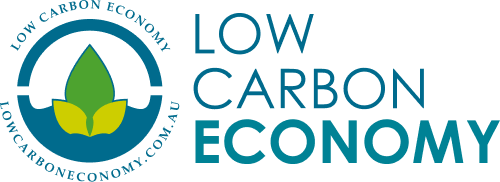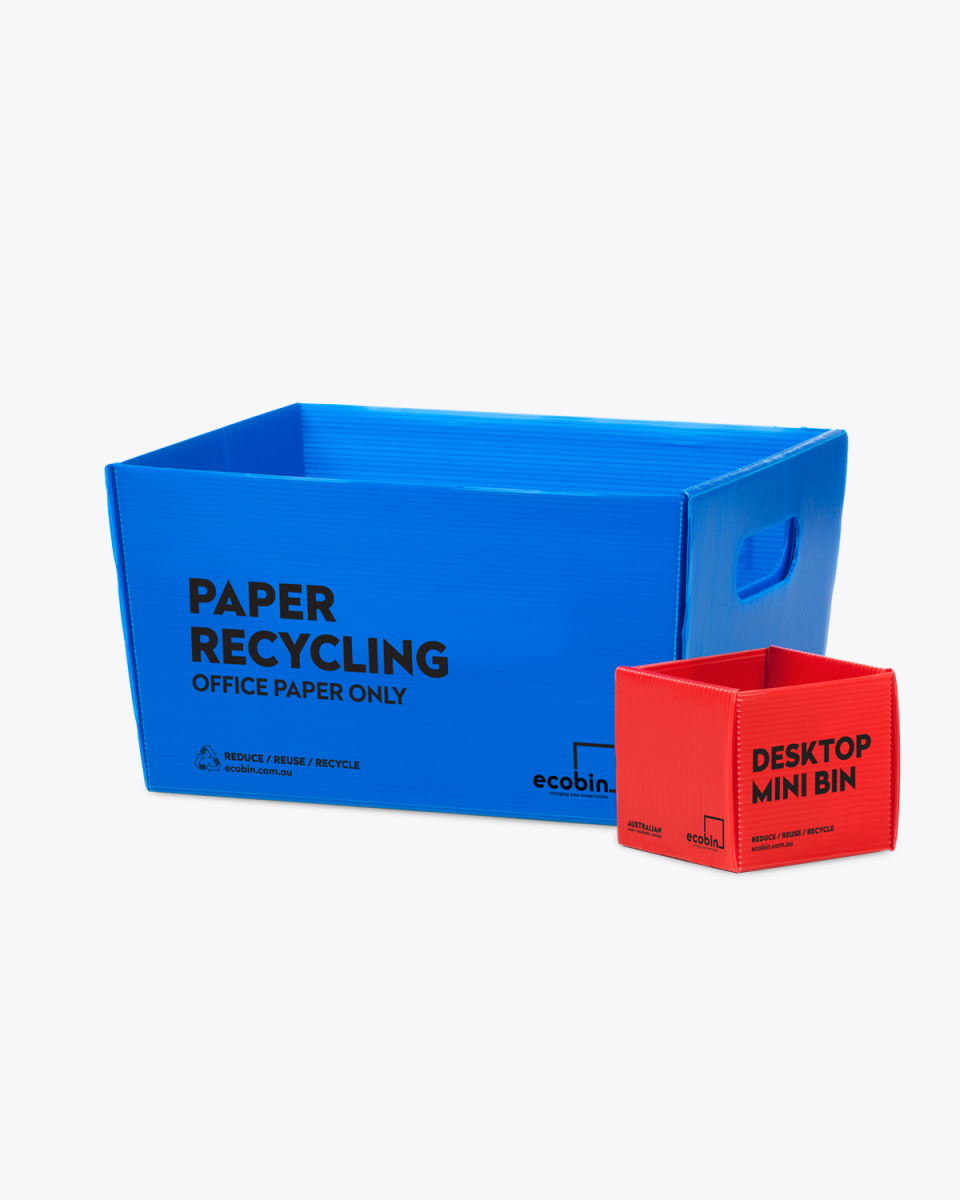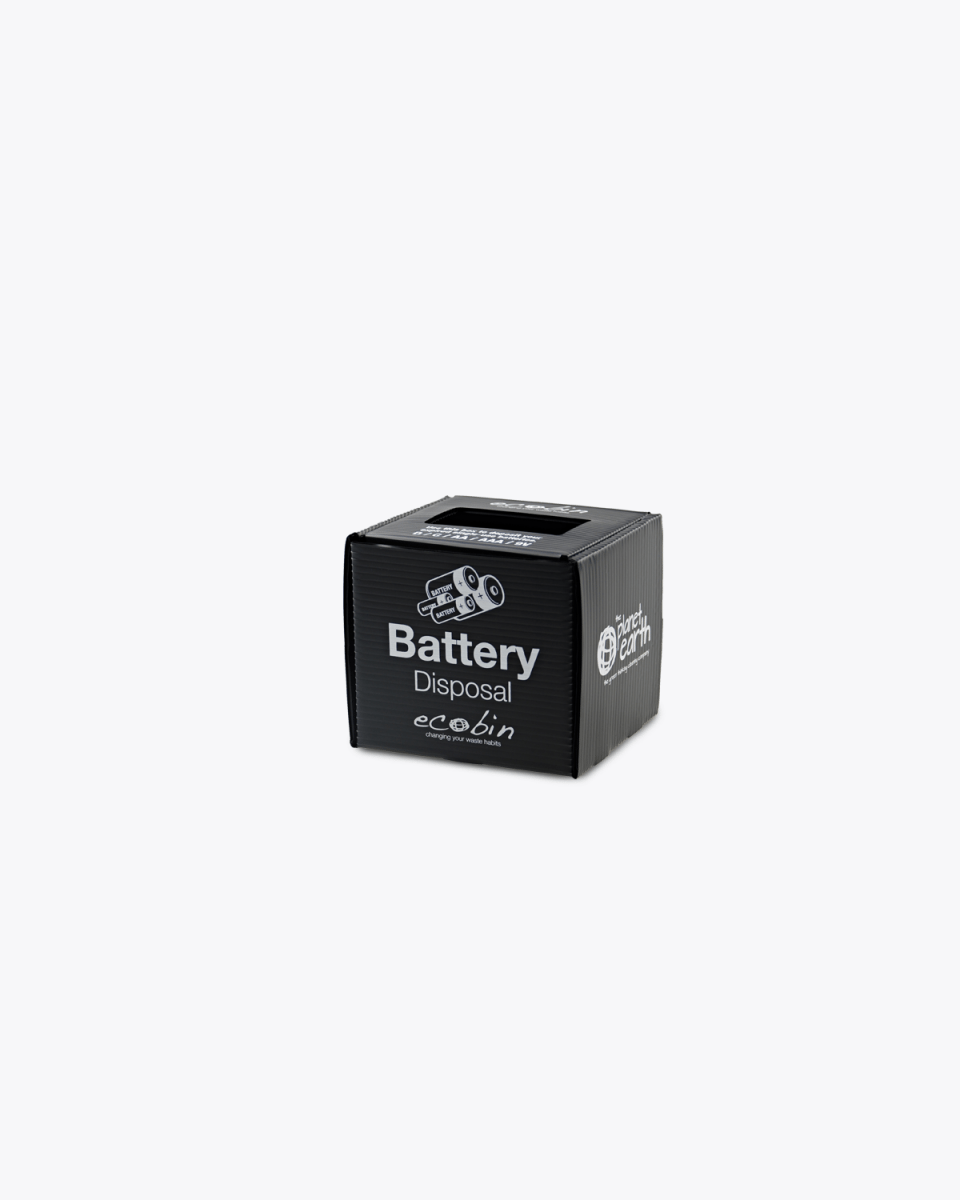Eco Bin supplies office and business recycling bins to institutional and business customers across Australia. Attractive by design with foolproof colour-coding, Eco Bins prove popular with staff and thus quickly overcome recycling reluctance. Reductions of 85% in land fill are common. Eco Bins has some specific design features that mean it has significant sustainability benefits over traditional solid injection moulded plastic bins.
These features include:
- Lightweight plastic, that has less density and therefore requires 75% less raw materials to produce.
- 50% less energy to manufacture.
- Most Eco Bins are flat packed, which means there are transport emissions savings.
- It’s recyclable at the end of life
- It takes very little water to produce and is chemical free in the recycling process, and
- The colour coding system is highly effective at minimizing contamination and diverting waste from landfill.
Eco Bin conducted a comparative LCA for their products against an injection moulded product, to verify these benefits. To certify their products as carbon neutral, Ecobin undertook the following process:
- Ecobin commissioned a comparative Life Cycle Assessment (LCA) audit from the Carbon Reduction Institute (CRI) to measure the carbon footprint of their products and compared them to emissions generated by injection moulded products. The emissions assessed include emissions generated from the raw materials, energy used in production, storage and transportation, packaging and end of life disposal. CRI’s LCA methodology follows the standards outlined by the by the World Business Council for Sustainable Development’s Greenhouse Gas Protocol Corporate Accounting and Reporting Standard (1), as well as the series of international standards for LCAs: ISO 14040 and ISO 14044. CRI’s assessment relied upon site-specific data from the manufacturer and materials suppliers, Ecobin and their operations, as well as published sources of relevant data and emissions factors.
- Ecobinhave committed to offset the unavoidable emissions associated with its’ carbon neutral products through the purchase of units in approved projects under the Verified Carbon Standard (VCS), and
- Ecobinhave committed to ongoing auditing of their product emissions by reporting unit sales of their carbon neutral products to CRI on a quarterly basis.
What does Carbon Neutral Product Certification mean?
By meeting the requirements of the NoCO2 Program, Ecobin products certified as a carbon neutral product by CRI; can be promoted and marketed as such, and can display the Carbon Neutral Product Logo issued by CRI.
What Carbon Credit Project does Paper Force purchase units from?
India Biomass
Environmental problems in India are growing rapidly. The increasing economic development and a rapidly growing population that has taken the country from 300 million people in 1947 to more than one billion people today is putting a strain on the environment, infrastructure, and the country’s natural resources.
India’s air pollution is exacerbated by its heavy reliance on coal for power generation. Coal supplies more than half of the country’s energy needs and is used for nearly three-quarters of electricity generation. While India is fortunate to have abundant reserves of coal to power economic development, the burning of this resource, especially given the high ash content of India’s coal, has come at a cost in terms of public health risk and environmental degradation.
Reliance on coal as the major energy source has led to a nine-fold jump in carbon emissions over the past forty years. The government estimates the cost of environmental degradation has been running at 4.5% of GDP in recent years.
Biomass projects are implemented in small or large industrial plants. Their aim is to utilize agricultural waste or other non-renewable biomass residues as fuel to generate power and to lower the plants’ dependence on the local grid for electricity. Before the implementation of the project, the electricity needs of such plants were met by power from a coal-dominated grid. To meet the rising energy demands in production, a new efficient biomass boiler was installed together with a steam turbine, producing both steam and electricity. The new boilers are fuelled with locally available agricultural waste instead of traditional, emission intensive coal.
Before the start of the project, these agricultural residues were not used. They were either burned without harnessing the resulting thermal energy or simply left to decay, thereby generating methane emissions. The plant’s steam and electricity requirements can be now supplied by the new cogeneration unit. The investment required for the installation of the new cogeneration unit could not have been raised were it not for the revenue from sales of carbon credits.
Beyond the reduction of greenhouse gases, these projects contribute to local sustainable development by:
- Creating jobs in the construction, maintenance, and operation of the plant as well as in the biomass logistics
- Creating additional income for farmers from agricultural waste
- Alleviating the load on the unstable regional electricity grid, while providing a steady supply of electricity to the plant
- Reducing emissions of air pollutants from fossil fuel burning like SO2, soot and particulate matter
- Demonstrating and spreading renewable energy technology
- Creating a business case for regional empowerment through environmentally friendly technology, and
- By utilizing locally available, sustainable fuel sources thereby reducing the dependence on energy imports on a national level.
To find out more about Ecobin and to purchase their products, please go to the link below:
Certifications
Carbon Neutral Product







